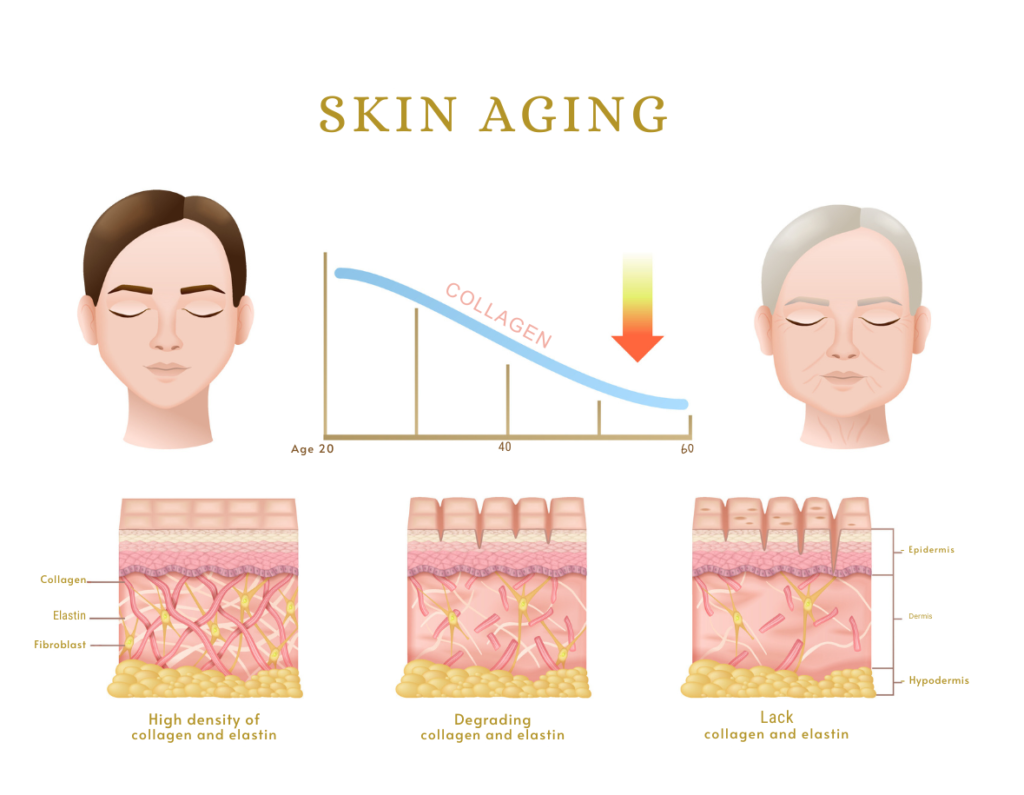Boost And Restore Your Collagen

Can You Rebuild Collagen In Your Skin?
Yes, you can rejuvenate and rebuild collagen in your skin naturally! In this comprehensive guide, we dive into effective techniques and skincare practices that stimulate collagen production naturally. From incorporating collagen-boosting foods into your diet to exploring skincare routines enriched with peptides and antioxidants, we’ll provide actionable insights to help rejuvenate and restore your skin’s collagen. Read on to discover the science-backed methods to promote collagen synthesis and unveil a revitalized, radiant you.
Collagen is the structural protein that plays a crucial role in maintaining the health and elasticity of our skin, hair, nails, and connective tissues. As we age, collagen production naturally decreases, leading to visible signs of aging such as wrinkles, sagging skin, and joint discomfort. Fortunately, there are natural ways to boost collagen and promote overall skin and joint health. In this comprehensive guide, we will delve into the science behind collagen, explore the factors influencing its production, and unveil effective strategies to naturally boost collagen in your body. The following image shows the rapid decline of collagen as we age.

What Depletes Collagen?
Understanding Collagen: Collagen is the most abundant protein in the human body, constituting a significant portion of our skin, bones, tendons, ligaments, and muscles. It provides structure, support, and elasticity to various tissues, making it a crucial component for maintaining youthful and healthy skin.
Types of Collagen: There are several types of collagen, with Type I, II, and III being the most predominant. Each type serves a unique function:
Type I: Found in skin, tendons, ligaments, and bones.
Type II: Mainly present in cartilage.
Type III: Plays a role in skin, blood vessels, and internal organs.
Factors Influencing Collagen Production:
Age: Collagen production naturally declines as we age, leading to the formation of wrinkles and sagging skin.
UV Exposure: Prolonged exposure to ultraviolet (UV) rays from the sun can accelerate collagen breakdown and decrease production.
Poor Nutrition: Inadequate intake of essential nutrients, such as vitamin C, zinc, and copper, can hinder collagen synthesis.
Smoking: Smoking has been linked to reduced collagen production and increased skin aging.
Free Radicals: Environmental pollutants and stress can generate free radicals, which contribute to collagen degradation.
Natural Ways To Boost Collagen
Incorporating these natural strategies into your lifestyle can significantly contribute to collagen production and promote overall skin and joint health. Remember, consistency is key, and adopting a holistic approach that combines a nutrient-rich diet, hydration, and protective measures against environmental factors will help you maintain youthful, radiant skin for years to come. Embrace these practices, and let the rejuvenation of your collagen levels unveil a more vibrant and confident version of yourself.
Natural Strategies to Boost Collagen:
Nutrient-Rich Diet: Vitamin C: Crucial for collagen synthesis, vitamin C is found in citrus fruits, berries, bell peppers, and leafy greens. b. Zinc: Supports collagen production and can be obtained from nuts, seeds, and seafood. c. Copper: A cofactor for collagen synthesis, copper is present in foods like organ meats, shellfish, and legumes. d. Protein: Adequate protein intake is essential, as collagen is composed of amino acids, the building blocks of proteins.
Hydration: Proper hydration is vital for overall skin health and collagen production. Water helps maintain skin elasticity and supports the transport of nutrients to skin cells.
Collagen-Boosting Supplements: Collagen Peptides: These supplements provide bioavailable collagen peptides that can be easily absorbed by the body, supporting skin elasticity and joint health. b. Hyaluronic Acid: Known for its ability to retain moisture, hyaluronic acid supplements promote hydration and support collagen structure.
Protecting Your Skin: Sunscreen, Regular use of broad-spectrum sunscreen protects the skin from UV damage and prevents collagen breakdown. b. Topical Retinoids: Retinoids stimulate collagen production and help reduce the appearance of fine lines and wrinkles.
Exercise: Regular physical activity promotes blood flow, delivering essential nutrients to skin cells and supporting collagen synthesis.
Antioxidant-Rich Foods: For Example, Berries (Blueberries, Strawberries, etc.): Packed with antioxidants that support collagen health. These edible fruit seeds are perfect for salads, juices, cakes, jams, and desserts. High-quality seeds ensure easy growth and can be planted in greenhouses, home gardens, nurseries, rooftops, balconies, and more.
Citrus Fruits (Oranges, Grapefruits): High in vitamin C. Try to eat them fresh or make a fruit salad and enjoy it for dinner or as a breakfast.
Bone Broth like Kettle & Fire Bone Broth: contains collagen and other nutrients beneficial for joint health.
Healthy Fats: Avocado Oil, Olive Oil, and Fatty Fish (Salmon): Provide essential fatty acids for skin health.
Green Tea: Choose Organic Green Tea, rich in antioxidants that may support collagen production.
Serums and Creams That Can Aid in Collagen Production
Collagen is a protein that provides structure to the skin, helping it remain firm and elastic. While the body naturally produces collagen, its production decreases with age, leading to wrinkles and sagging skin. Using collagen-based products in your skincare routine can help support skin health and appearance. Here are some options:
Collagen Creams and Serums:
Neutrogena Rapid Wrinkle Repair Serum: Contains hyaluronic acid and retinol to promote collagen production. Neutrogena Rapid Wrinkle Repair Night Cream is a potent anti-aging solution with retinol and hyaluronic acid. It brightens skin tone and smooths texture. It’s free from parabens, mineral oil, and dyes—ideal for your daily anti-aging skincare routine.
Mario Badescu Collagen Moisturizer SPF 15: A daytime moisturizer with collagen and SPF protection. It only offers SPF 15, so it is recommended to use a higher sunscreen on top of it.
Collagen Sheet Masks:
Dermal Korea Collagen Essence Full Face Facial Mask Sheet: A popular sheet mask infused with collagen for a quick boost.
Retinol Products:
RoC Retinol Correxion Deep Wrinkle Night Cream: Retinol helps stimulate collagen production and reduce the appearance of wrinkles.
DIY Collagen Masks:
You can create your own masks using natural ingredients like egg whites, which contain collagen-boosting properties.
Collagen-Infused Moisturizers:
L’Oreal Paris Collagen Moisture Filler: A moisturizer that claims to hydrate and replenish collagen levels.
Collagen Eye Creams:
Olay Eyes Ultimate Eye Cream: Designed to address multiple eye concerns, including fine lines and loss of firmness.
Using Red Light Therapy: A red light therapy mask promotes skin rejuvenation by stimulating collagen production, aiding wound healing, reducing inflammation, and providing potential pain relief through improved circulation. Adherence to usage guidelines is essential for optimal results, and consulting with a healthcare professional is advised for specific skin concerns or medical conditions.
Lasers and Procedures That Stimulate Collegen Production
Lasers and procedures that stimulate collagen production are commonly used in dermatology and cosmetic medicine to improve skin texture, reduce wrinkles, and address signs of aging. Here are some of the lasers and procedures known for promoting collagen production:
Fractional Laser Resurfacing:
How it works: Fractional lasers create microscopic injuries in the skin, stimulating collagen production during the healing process.
Benefits: Improves skin texture, reduces wrinkles, and enhances overall skin tone.
Microneedling:
How it works: Fine needles create tiny punctures in the skin, triggering the body’s natural collagen and elastin production.
Benefits: Addresses fine lines, acne scars, and improves skin firmness.
Ultherapy (Ultrasound Therapy):
How it works: Uses focused ultrasound energy to penetrate deep layers of the skin, stimulating collagen production.
Benefits: Lifts and tightens skin, particularly in the face and neck.
Radiofrequency (RF) Therapy:
How it works: RF energy heats the skin, promoting collagen synthesis and tightening loose or sagging areas.
Benefits: Improves skin elasticity, reduces wrinkles, and tightens the skin.
Intense Pulsed Light (IPL) Therapy:
How it works: Broad-spectrum light targets pigmented cells and stimulates collagen production.
Benefits: Evens out skin tone, reduces sun damage, and promotes collagen renewal.
CO2 Laser Resurfacing:
How it works: Removes outer layers of damaged skin, prompting the formation of new collagen-rich skin.
Benefits: Effective for reducing deep wrinkles, scars, and improving skin texture.
Platelet-Rich Plasma (PRP) Therapy:
How it works: Involves injecting concentrated platelets from the patient’s blood to stimulate collagen and tissue regeneration.
Benefits: Enhances skin texture, promotes healing, and can be used in conjunction with other procedures.
LED (Light Emitting Diode) Therapy:
How it works: Certain wavelengths of light stimulate cellular activity, including collagen production.
Benefits: Improves skin texture, reduces inflammation, and promotes healing.
Fibroblast Therapy:
How it works: Plasma pen treatments create controlled micro-injuries, prompting the skin to produce more collagen.
Benefits: Tightens loose skin, reduces wrinkles, and improves overall skin elasticity.
DermaPen (Microneedling with Radiofrequency):
How it works: Combines microneedling with radiofrequency energy for enhanced collagen stimulation.
Benefits: Addresses fine lines, wrinkles, and skin laxity with improved efficacy.
Remember, it’s always a good idea to consult with a healthcare professional before adding new supplements to your routine, especially if you have any existing health conditions or concerns. Additionally, maintaining a balanced diet, staying hydrated, protecting your skin from sun damage, and avoiding smoking can contribute significantly to collagen production and overall skin health. Also, when choosing collagen skincare products, consider your skin type and specific concerns. Additionally, it’s essential to use sunscreen daily, as sun protection plays a crucial role in preventing collagen breakdown and maintaining healthy skin. Keep in mind that individual results may vary, and consistency in using these products is key to seeing potential benefits.
Image by wayhomestudio on Freepik
- Categories
- Blog

